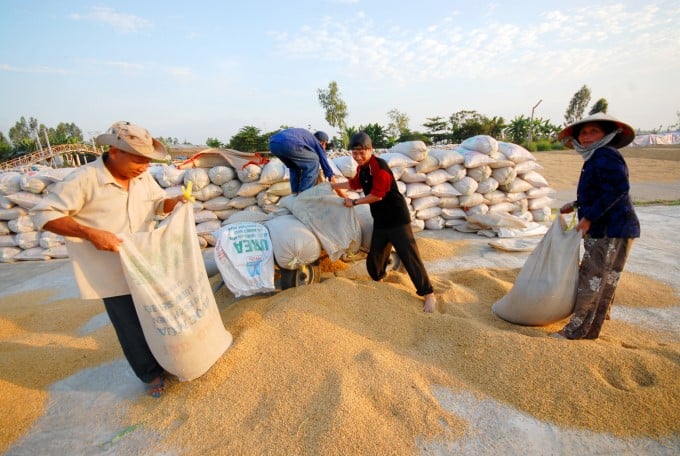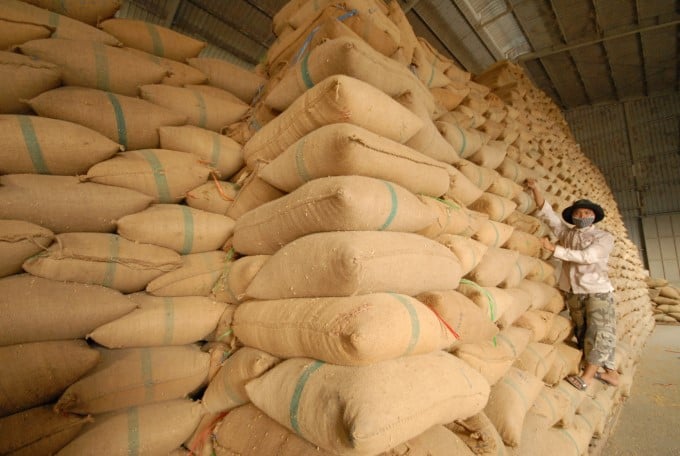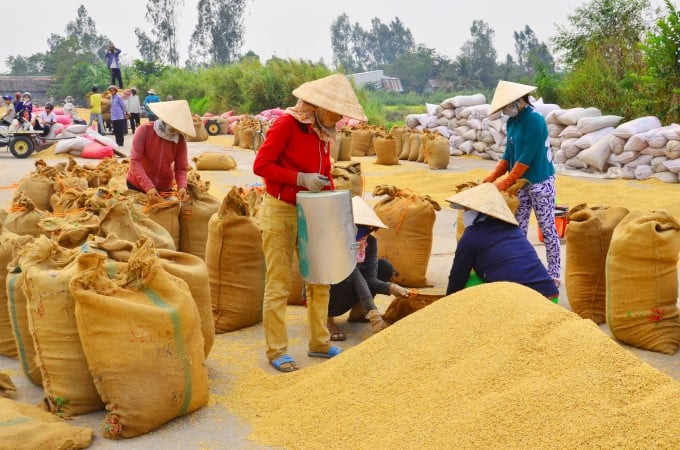November 27, 2025 | 19:30 GMT +7
November 27, 2025 | 19:30 GMT +7
Hotline: 0913.378.918
November 27, 2025 | 19:30 GMT +7
Hotline: 0913.378.918
Cuu Long Delta is Vietnam’s most favorable place to produce food. Following that logic, food security is considered to have a stable and plentiful amount of rice. Accordingly, rice areas, crop numbers and yields must be maintained at a high level. Any impacts on rice yield such as flood water, saline intrusion in the coastal dry season need to be solved immediately.
Cuu Long Delta produces about 25 million tons of rice annually, exports more than half of it, mostly of low value and we think that is food security. But in the food security rankings, Singapore ranks number one in the world and Vietnam only ranks 54/113 despite being the top largest rice exporter in the world. It is clear that the food security strategy needs to be reconsidered.

Cuu Long Delta produces about 25 million tons of rice annually, and exports more than half of it. Photo: Le Hoang Vu.
As defined by FAO, food security is “Having food available at any time, physically and economically accessible, sufficiently in quantity, in safety, and in nutrition, to meet the needs of eating appropriately for a positive and healthy life”.
Thus, food security is not about self-production, but about accessibility by the economy, buyable using money. In order to prevent an unexpected crisis or crisis, it is necessary to have a backup source. It will be more secure if the backup source can be self-produced but not necessarily so, as it can be purchased to reserve.

Rice harvest in Cuu Long Delta. Photo: Le Hoang Vu
It should be emphasized that one aspect of food security is sustainability, because food security is not just for one year, ten years, twenty years but for sustainability for generations to come.
For a long time, our food security strategy mainly focuses on self-production, tightly concentrated in rice, using the “high input - high output” method. Consequently, our rice yield is multiple times higher than other ASEAN countries (Vietnam’s rice yield was at 5.6 tons/ha in 2016, 2 times higher than Thailand, 1.5 times higher than India), but the amount of fertilizers and pesticides used was also higher, leaving behind environmental and health implications.
With this approach, the land was exhausted. Accompanying with the goal of maximizing rice production is a huge water-regulating system that disturbs the natural system, cutting contact between the river and the sea, causing them to gradually degrade. Land, rivers, and seas have to bear an enormous amount of fertilizers, pesticides, and pollution from agriculture.

Also, usually, when we think of food security, we often think about having a food stockpile in case something goes wrong. Photo: Le Hoang Vu.
Also, usually, when we think of food security, we often think about having a food stockpile in case something goes wrong, but the storage in the warehouse is not long because, after a few years, they have to leave the warehouse and be replaced with new food. A safer, longer-term storage place is actually in the health of the soil and water, as the strategy of maintaining high rice yields will not guarantee the certainty of long-term food security.

In order for food security not to be instant, but in the long term, agriculture needs to be transformed in nature, not just superficial restructuring. Photo: Le Hoang Vu
In order for food security not to be instant, but in the long term, agriculture needs to be transformed in nature, not just superficial restructuring.
Firstly, reduce the number of intensive agriculture, nourish the soil, and ensure sustainable production capability for the land.
Secondly, aim at a gradual strategic shift, not pursue the export of cheap raw agricultural products which bases solely on volume strength.
Thirdly, the total rice area should not be tightly kept. Instead, it should be more flexible, keeping only the agricultural area, and there should be more than rice production on that agricultural area, as long as it is food production.
The agriculture shift should base on respect for the natural law in line with the Government's Resolution 120 on the Cuu Long Delta. Specifically, interventions that go against the laws of nature should be limited, because even if achievements can be obtained in short term, in the long run, things that contradict the law of nature will be fragile, and those that conform to the laws of nature will be more solid.
Translated by Samuel Pham

(VAN) On November 27, in the meeting with Minister Tran Duc Thang, Mayor Yin Yong shared Beijing’s experience to improve environment and air quality.

(VAN) After 30 years, both sides identified strategic areas of cooperation: sustainable production, increasing coffee value and training for farmers.
/2025/11/27/4910-4-164708_294.jpg)
(VAN) On the afternoon of November 27 in Beijing, Minister of Agriculture and Environment Tran Duc Thang held a working session with several major Chinese enterprises operating in the agriculture and environment sector.

(VAN) The Department of Animal Health issued a provisional guideline requesting local authorities to increase surveillance, collect samples for testing, and conduct epidemiological investigations according to the established procedure.

(VAN) The United Nations recommends that Vietnam utilize data and artificial intelligence to enhance early disaster warnings and reduce GDP losses by 3.2% in the context of climate change.

(VAN) On the morning of November 27 in Beijing, Minister Tran Duc Thang and the Deputy Commissioner General of the General Administration of Customs of China signed a protocol on fresh jackfruit exports.

(VAN) As floodwaters recede, a vast network of irrigation works across eastern Gia Lai is emerging in a state of severe disrepair, with extensive damage demanding urgent restoration ahead of the 2025-2026 winter-spring cropping season.